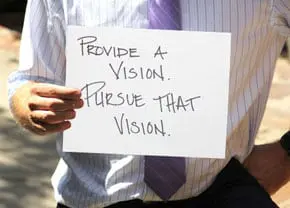
Table of Contents
ToggleWhat are the top attributes, characteristics, and traits that make up an exceptional Executive Director?
As a leadership search firm that finds breakthrough Executive Directors for nonprofits, we’ve had unique experiences and perspective on this question. We interview executive directors for breakthrough leadership opportunities every day.
What have we found? And, perhaps more importantly, what do the nonprofit leaders in the Y Scouts Leadership Community say make an Executive Director “exceptional?”
Here’s what our executive nonprofit recruiters and leadership community had to offer about the ten attributes of an exceptional Executive Director.
Authenticity. People respond well to others who don’t try to hide who they are. Executive Directors are no different. You could have lunch with an Executive Director and be at ease. Exceptional Executive Directors encourage their nonprofit staff to be themselves.
Self-awareness. An effective Executive Director is aware of their actions and reflect on decisions without any bias. They invest in themselves and put in a lot of effort to use their strengths to the max.
Relentless Learner. For most Executive Directors, the learning never stops. They attend events, independently go online and research topics, and are driven to understand how things are done.
Focus on long-term results. Executive Directors don’t waste precious time worrying over the temporary setbacks. Their focus is always on the long term, and know that patience yields results in the long run.
Productivity Driver. Executive Directors examine trends and developments among the staff to influence and create an environment that works towards the nonprofit’s mission.
Inspires Others. If an Executive Director can’t inspire others, then volunteer development, fundraising, the Board of Directors, and nonprofit staff won’t be inspired to serve the mission either. Everything starts at the top.
Community Presence. An effective director builds and gains their personal and organizational presence on the local level. They’re the face of the nonprofit, and managing that brand directly lends to the success of the organization.
Relentless Recruiter. Almost half of all time an ED spends is spent recruiting. By recruiting and empowering volunteer leaders, the organizational mission is collectively achieved.
Fundraiser. Some ED’s don’t like to fundraise. The exceptional ones are fantastic fundraisers. They support the fundraising efforts by cultivating and nurturing all relationships – not just the ones that are considered to be “major.”
Leads the vision with purpose. Above all, the executive director is able to communicate a compelling and inspired purpose. When they talk, it’s always about beyond today. They talk about possibilities in an optimistic way with real measureables to ensure the vision is achieved. They lead, inspire and motivate by simply sharing their vision.

What to Look for in an Executive Director
After researching when to hire an Executive Director, it’s time to consider what to look for in an Executive Director. But how do you know which qualities make an Executive Director successful?
As a nonprofit executive search firm, Y Scouts looks for exceptional Executive Directors who align with an organization’s purpose, values and culture. However, there are many other personal attributes and elements of expertise that can contribute to a candidate’s success in the workplace. If you’re unsure about what to look for in an Executive Director, here are five qualities you can consider.
1. Cultural Fit
Cultural fit is one of the most important attributes to look for in an Executive Director. An ED who fits in with your organization will have an easier time adjusting to the position, and will have an easier time forming relationships with your current staff. Since your Executive Director represents the company, it’s important to hire someone who shares your organization’s mission and values.
In the research and planning phases of your search, conduct an organizational DNA survey with your staff to define your culture. Analyze your staff’s answers so that you know precisely who you are looking for.
2. Industry Understanding
If a candidate has a thorough understanding of the nonprofit world, he or she will already have a good idea of what your organization is doing and what it’s biggest challenges are. If the candidate also knows how the industry is evolving, he or she should have a general idea of what your nonprofit needs to do in order to stay on top of the changes. All of this knowledge is extremely important to look for in an Executive Director, because it shows that the candidate is capable of steering your organization in the right direction.
3. Modern Functional Expertise
An Executive Director should have a variety of functional skills and expertise. One of the areas where your candidate should excel is having excellent communication skills. Your ED will need to talk to donors, employees, and the public about who the organization is, what you are doing, and why what you are doing is important. As the main representative of your nonprofit, it is important that the Executive Director can speak with confidence, which is why communication skills are essential to the job.
In addition to communication skills, there are a variety of other areas where your Executive Director should have expertise. When you are designing the role, make sure to survey your staff to see what areas of expertise they’d like to see in an ED. By surveying your staff and analyzing their responses, you’ll be able to identify to critical elements required of every candidate.
4. Develops People
No matter what your nonprofit does, there will be always a need to develop the people who work at your organization. New developments in your industry will arise, and these developments may change the course of the industry. An exceptional Executive Director knows this, and will spend time developing staff so they can adapt to these changes quickly and effectively.
When vetting candidates, seek to learn about how they’ve developed their people at their prior organizations.
5. Drives Results
When deciding what to look for in an Executive Director, consider how a candidate will affect your nonprofit in the future. Using their knowledge of the industry, an Executive Director should be able to get a general idea of what path your nonprofit needs to follow in order to succeed. However, it is important to find an ED who not only knows where the organization needs to know, but how it is going to get there. With an Executive Director who knows how to execute ideas in order to achieve a set goal, your organization can reach the results that it sets for itself.
6. Learns Relentlessly
Nonprofit organizations know that the best staff are the ones who learn relentlessly. The traits of a leader naturally trickle down throughout the organization. If you want to breed a staff of relentless learners, find an Executive Director who invests in themselves through relentless learning.
You might be interested in these other posts about hiring an Executive Director:
- When to Hire an Executive Director
- How to Hire an Executive Director
- 5 Specific Executive Director Interview Questions
- What to Pay an Executive Director
- Private Equity Executive Search Firm
How did you decide what qualities to look for in an Executive Director? Contact us to share your comments.
Y Scouts is an executive search firm that helps nonprofits and social enterprises find exceptional leaders. Contact us if you are looking to find an exceptional leader. To be considered for exceptional leadership opportunities with our clients, please take the first step by joining the Y Scouts Leadership Community.
Client Testimonials:
“The services Y Scouts performs are so inherently humane in nature, and that’s how they approached it from the beginning. Rather than viewing the roles we asked them to help us fill as holes in our organization chart, they realized we were really looking to add leaders with very specific talents and a passion to join our specific culture and ecosystem. Their approach to finding candidates that share our core virtues first is very similar to our proven and trusted process for finding committed faculty in our academies. Our leader they placed has already been delivering impact in ways we hadn’t expected. He’s been the absolute example of how adding the right person can be worth a multiple on the investment.”
– Ward Huseth, CHIEF FINANCIAL OFFICER AT GREAT HEARTS ACADEMIES
“I have had a great experience working with Paul and Y Scouts. Paul has led our agency through the recruitment process for a new CEO with great results. He is knowledgeable, helpful, always available to support us through all of the decision points we encountered. I recommend Paul as someone who will get results, but also someone you will enjoy working with.”
– Linda Volhein, INTERIM CEO AT YOUTH EVALUATION AND TREATMENT CENTERS | VALLEY CLINICAL SERVICES
Frequently Asked Questions
Q: What are the qualities of an executive director?
A: An executive director should possess strong leadership skills, strategic thinking, and excellent communication abilities. They need to be adept at decision-making, problem-solving, and managing both staff and resources effectively. Financial acumen, organizational skills, and a deep understanding of the organization’s mission and goals are also essential.
Q: What are the behaviours of an executive director?
A: An executive director should exhibit proactive leadership, clear communication, and effective decision-making. They must model integrity, foster a collaborative environment, and handle challenges with resilience. Additionally, they need to think strategically, set goals, and inspire their team to achieve the organization’s objectives.
Q: What is the personality of an executive director?
A: An executive director usually excels as a leader, demonstrating assertiveness and guiding their team toward success. Their skills in making decisive choices and handling pressure make them well-suited for managing stressful situations effectively.
Q: What is expected of an executive director?
A: An executive director is expected to be a strategic leader who sets clear goals and steers the organization towards its mission. They need to manage resources wisely and keep the financials on track while fostering a positive and supportive work environment. Building strong relationships with stakeholders, making important decisions, and representing the organization are all part of the role.


